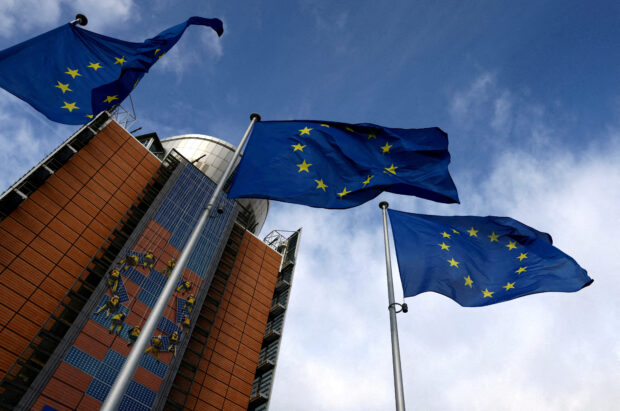Euro zone to tighten fiscal policy in 2024, some still to spend too much

European Union flags flutter outside the EU Commission headquarters, in Brussels, Belgium, Feb 1, 2023 REUTERS/Yves Herman
BRUSSELS –Euro zone fiscal policy will be tighter on aggregate next year but several countries, including France and Italy, plan to spend too much, breaking EU recommendations, the European Commission said on Tuesday after analyzing draft euro zone 2024 budgets.
“The aggregate fiscal stance for the euro area is projected to be contractionary in 2024 on the back of an almost complete phase out of the remaining energy-related measures,” the Commission said in a statement.
The Commission forecast on Nov. 15 that the aggregated budget deficit of the 20 countries using the euro would fall to 2.8 percent of GDP in 2024 from 3.2 percent in 2023.
This will be welcome news for the European Central Bank which has raised interest rates to record highs to slow down inflation. The bank had some success, but at the cost of also slowing economic growth to 0.6 percent in 2023 from 3.4 percent in 2022.
READ: ECB keeps rates on hold, rejects talk of future cuts
The 2024 draft budgets assessment is part of the Commission‘s task to monitor if governments do not break EU laws that limit national borrowing in a currency union.
The laws, called the Stability and Growth Pact, are now under review and the 2024 draft budgets are assessed using criteria that governments agreed on earlier this year, some of which are likely to become part of the revised EU fiscal rules.
The three main criteria are that governments should not cut investment, should withdraw energy support measures launched in 2022 during the energy price crisis, and use the savings to cut deficits to keep spending growth within limits set by the Commission and agreed on by EU finance ministers.
“A number of draft budgetary plans include plans to pursue prudent fiscal policies, withdraw energy support measures in 2023 and 2024 and use the savings from these measures to reduce the deficit,” the Commission said.
“However, some Member States do not sufficiently limit the growth of net nationally financed primary expenditure, and some do not plan to withdraw their energy support measures fast enough or use the savings from these measures to reduce the deficit,” it said, adding all preserved investment.
READ: Euro zone factory downturn deepened in October -PMI
Not good enough
The Commission said 2024 draft budgets of Cyprus, Estonia, Greece, Spain, Ireland, Slovenia and Lithuania ticked all the boxes. Austria, Germany, Italy, Luxembourg, Latvia, Malta, Netherlands, Portugal and Slovakia did so only partially.
Draft budgets of Belgium, Finland, France and Croatia, however, were at risk of breaking the agreed principles.
“The Commission invites Belgium, Finland, France and Croatia to take the necessary measures… to ensure that fiscal policy in 2024 will be in line with the Council Recommendation of July 2023,” the Commission said, referring to country-specific recommendations agreed on by all EU governments in July.
Such recommendations included the maximum net expenditure growth for 2024 — an indicator that is to become the key yardstick in the new rules, calibrated to gradually bring down public debt over a period of four to seven years.
France was asked by EU finance ministers in July to keep its spending growth in 2024 at no more than 2.3 percent, but the Commission said the draft French budget foresees spending growth of 2.8 percent. France is also not phasing out energy support measures quickly enough, the Commission said.
Italy was supposed to keep spending growth next year at no more than 1.3 percent. While Rome’s 2024 draft budget envisages only a 0.9- percent increase, the Commission said it masked overspending because in 2023 Italy will spend 0.8 percent of GDP more than previously expected, therefore the 0.9% in the budget would be growth from a much higher base.
The Commission also said that while Italy was winding down some 1 percent of GDP in energy support, it planned to spend it, rather than cut the deficit, as agreed by EU finance ministers.